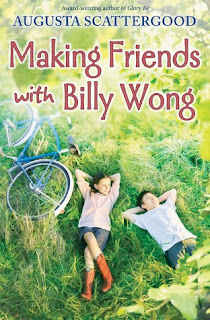This week's blog post comes courtesy of Recorded Books (who provided FUZZY) and Elizabeth Sims, contributing editor to Writer's Digest, whose article, "Stepping Up Your Sidekicks" in the February, 2017 issue, prompted the template for this review.
Tom Angleberger, best known as the author of the popular Origami Yoda series, co-wrote FUZZY, a clever middle grade book with Paul Dellinger. The premise is guaranteed to attract both boy and girl readers: What happens when an experiment to create a robot that mimics a middle school student is so successful that the robot actually begins to think and act like a middle schooler?
Chaos. Trouble. Fun. And a slew of interesting dilemmas for the scientists behind the Robot Integration Project.
SYNOPSIS
The protagonist, Maxine Zelaster (aka Max) is a smart, seventh grader struggling against a school increasingly dominated by vice-principal BARBARA--the computer who runs Vanguard One's Middle School. She is so determined to have an excellent school that her rules end up being burdensome and ridiculous. When Max demonstrates initiative or out-of-the-box thinking, BARBARA punishes her by lowering her test scores. Max gets into trouble with her parents and the threat of being sent to a disciplinary school looms over her. Fortunately for Max, she is also Fuzzy's mentor-friend.Although misunderstandings with Max's parents and conflicts with the school's administration is an interesting plot, the real focus of the book is Fuzzy, the robot. He is named this because he is learning to think how humans do--which can be fuzzy at times, not totally logical or linear.
Fuzzy, in Elisabeth Sims' words, is Max's sidekick.
Sidekicks fulfill several functions heroes can't, and they make us love them while they do it. A good sidekick can provide support for the protagonist--or inadvertently screw things up for her. He can pivot the plot in sudden, unexpected directions, or bring a fresh set of eyes to a problem...Without sidekicks, many heroes would be mere shadows of themselves. (p. 58)Fuzzy does all of this for Max from encouraging her to cheat on a test (which totally goes against Max's grain and gets her into trouble) to breaking into BARBARA's office and trying to, I'll put this nicely, re-program the vice-principal.
Seven Types of Sidekicks
According to Sims, there are seven kinds of sidekicks:
- The Chronicler (think Nick Caraway in The Great Gatsby).
- The Servant Savant (think Jim, Huckleberry Finn's trustworthy companion).
- The Gang (think Ron and Hermione in Harry Potter).
- The Rogue (think HAL 9000 in 2001: A Space Odyssey).
- The Enigma (think Creature in Frankenstein).
- The Pain in the Rear (think Chris in Zen and the Art of Motorcycle Maintenance).
- The Loyalist (think Samwise Gamgee in The Lord of the Rings.) (pp. 58-60)
Their primary purpose is simple: to show that at least one person feels the hero is worthy enough to deserve a steadfast friend. They act as messengers, deflect unwanted attention from the hero, or come to the hero's rescue. [Fuzzy decides it is his duty to figure out why Max's test scores are plummeting and to do something about it. Which leads to the afore-mentioned altercation with BARBARA.] Ultimately, however, a true loyalist must be willing to sacrifice his life--literally or metaphorically--for the protagonist. (p. 60)Which Fuzzy does. But since this is science fiction, Max doesn't get thrown out of school, Fuzzy gets a second life, and all's well that ends well.
Sims suggests that in order for writers to create unforgettable sidekicks they should "possess some or all of the following attributes." Let's see how Fuzzy measures up.
- They are fiercely loyal to the hero. Check.
- They are different in at least one key respect from the hero (in temperament, class, gender, race, age, etc.) Check. You can't be more different than non-human.
- They possess a strong moral compass (rogues being the notable exception.) Check. Even though Max does not have a conscience, as he becomes more and more human, he has a growing sense of right and wrong.
- They have unique, useful skills. Check. Fuzzy's ability to access information instantaneously, tap into the school's computer system, and compute logical outcomes is very useful to Max.
- They are somehow dependent on the hero, if only emotionally. Check. Fuzzy finds "himself" attached to Max.
- They're not looking to overshadow or be more valuable than the hero. Check
- They have unique backstories and character arcs. Check. Even as a robot, he learns and grows.
- They are too essential to the hero and the story to be killed off. Check. (p. 60)
Erin Moon, the narrator, did an excellent job of portraying the different characters. Even though I finished listening to this book a month ago, I can still hear Fuzzy's voice in my head!
Classroom Resource
Not only could a middle school teacher ask her students about the role of the sidekick, this book could generate great classroom discussion:
- What is the role of technology in schools and society?
- If you were a student at Vanguard, would you have made the same choices as Max? Why or why not?
- Can an inanimate object like a robot have a conscience? Could it/he make moral decisions?
- How was Fuzzy sacrificial for Max? Can a robot do this?
- Fuzzy gets a "second life." Are there implications of this theme?












